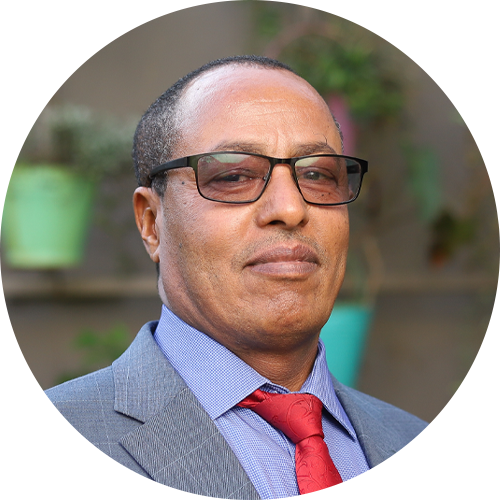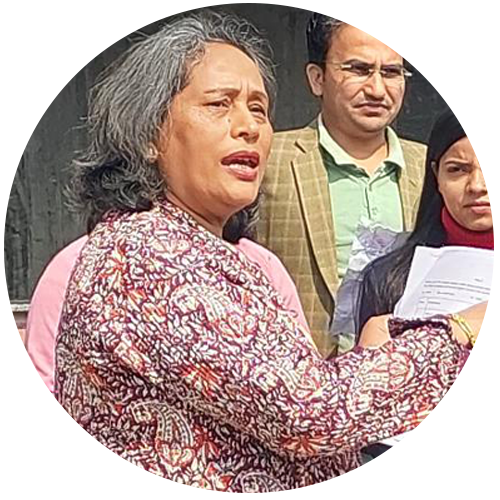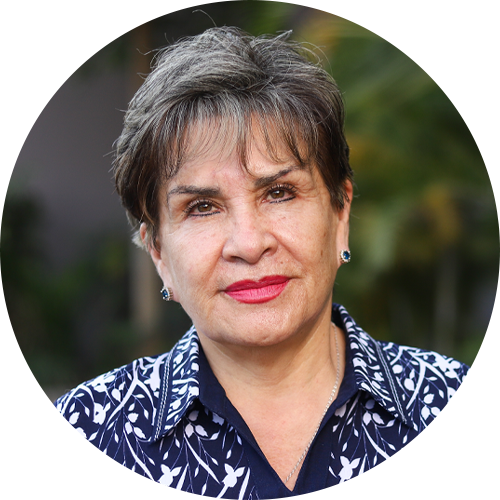For over 50 years, we’ve resisted and persisted, working hard alongside our partners to achieve historic law and policy changes that have expanded reproductive rights and abortion access for millions around the world—from the Democratic Republic of Congo and Ethiopia to Nepal, Pakistan, Mexico and Bolivia.
Change doesn’t happen overnight—and often not without major setbacks and opposition. But we keep going, knowing that our proven strategies, incredible partners and deep commitment to reproductive justice will prevail.
Here are nine examples of how we’ve worked to catalyze significant law and policy changes that expand abortion and reproductive rights:
1.
A 20-year-old law change that’s still saving lives across Ethiopia
Twenty years ago, Ethiopia liberalized its abortion law in a landmark decision that has saved lives and expanded rights across the country. It’s a story of incredible resilience by advocates, health workers, policymakers and Ipas Ethiopia staff and partners who worked for the change. And today, that progress continues.
Since the law change, far fewer women have suffered death or injury from unsafe abortion, and more people have had the power to decide their own futures.

“Before the reform, unsafe abortion accounted for one-third of all maternal deaths—among the highest in the region. After the law was revised and implemented, complications from unsafe abortions dropped dramatically. Maternal deaths due to unsafe abortion decreased from 32% to less than 5%.”
– Dr. Demeke Desta, director of Ipas Ethiopia
2.
Ipas’s training and advocacy efforts help transform abortion access in Nepal
Before 2002, abortion was illegal in Nepal. Women who had them were imprisoned, and half of all hospital admissions were due to complications from clandestine abortions with unsafe methods. Thanks to the advocacy efforts of Ipas Nepal and key partners, abortion went from being criminalized to being legal for any reason up to 12 weeks of pregnancy. Since then, access has only expanded.
Dr. Deeb Shrestha Dangol, an OB-GYN and head of health systems and policy for Ipas Nepal, has fought to expand abortion access for over 20 years—in part by fighting abortion stigma. She uses an Ipas training approach called abortion values clarification for action and transformation (VCAT), a method of challenging abortion stigma that today boasts national recognition in Nepal. Government staff train health workers throughout the health system using national VCAT guidelines created in collaboration with Ipas Nepal.

“As an OB-GYN myself, I attended [a VCAT training] and saw firsthand how this could impact stigma reduction in a powerful way.”
– Dr. Deeb Shrestha Dangol, head of health systems and policy for Ipas Nepal
3.
Mexico’s Supreme Court declares criminalizing abortion unconstitutional
In 2021, Mexico’s Supreme Court declared unconstitutional laws that criminalize people who have abortions, those who support them through the process, and health workers who provide the service. In its ruling, the Court recognized a constitutional right to choose to end a pregnancy and the obligation of the State to ensure access to safe and free abortion in the country.
Based on this ruling, several Mexican state governments have legalized abortion and health institutions have been ordered to ensure abortion care is provided. Advocates for abortion access across Mexico—including Ipas and its many partners in the Green Wave feminist movement who helped secure this victory—now continue pushing for the total decriminalization of abortion in accordance with the World Health Organization’s abortion guidelines.

“This is a huge and historic victory for Mexico and for the entire region—one that puts human rights front and center. This ruling recognizes people’s reproductive autonomy and returns abortion to where it belongs—as a matter of health and rights.”
– Anu Kumar, Ipas president and CEO
4.
‘A great day for Congolese women and girls’ as access to legal abortion expands
In another big step forward for women’s rights in the Democratic Republic of the Congo (DRC) in 2020, the Ministry of Health approved standards and guidelines for comprehensive abortion care that align with the Maputo Protocol—a groundbreaking treaty adopted by African states to protect and promote the rights of African women.
Although the Maputo Protocol effectively became the law of the land when it was published in the DRC’s legal gazette in 2018, national standards and guidelines for abortion care still needed to be established to make the promise of abortion access a reality. Ipas and key partners spent months working with the Ministry of Health to develop the new guidelines.

“This is a great day for Congolese women and girls. The endorsement of these progressive standards is an important part of facilitating access to safe and legal abortion in the country.”
– Dr. Jean-Claude Mulunda, director of Ipas DRC
5.
A victory for women’s rights and equality as Argentina legalizes abortion
The tireless work of abortion rights advocates paid off in 2021 when Argentina’s senate voted to legalize abortion—a historic shift since abortion was previously only legal in cases of rape or risk to a person’s health or life. The new law makes abortion legal under all circumstances through 14 weeks of pregnancy, with exceptions after that point for rape and a pregnant person’s health. And abortion is now available free of charge in public hospitals.
Ipas supported key partners and advocates for years in their work to build policymakers’ support for legal, accessible abortion in Argentina. Abortion rights advocates here and across Latin America have worn green handkerchiefs, a bold symbol of what’s become known as the ‘green wave,’ a movement washing across the region and showing the power of collective activism.

“[The new law] is the result of a constant and sustained effort by the women’s movement, which strengthened the social debate about abortion rights, took it to the streets and expanded it to different sectors. Professional, academic and social organizations worked together in a very committed way.”
– Mariana Romero, director of Ipas’s partner CEDES (Centro de Estudios de Estado y Sociedad / Center for State and Society Studies)
6.
Nigeria celebrates state-level law to combat gender-based violence
In 2021, in a major step forward in the fight against sexual and gender-based violence in Nigeria, Jigawa State adopted legislation to implement the federal Violence Against Persons Prohibition (VAPP) Act.
To push the bill forward in Jigawa State, Ipas Nigeria Health Foundation and partners conducted months of advocacy work with leaders and members of the State Assembly and other key stakeholders. Ipas Nigeria also sponsored radio programs across the state to raise awareness on how to report cases of sexual and gender-based violence.

“The passage of state-level VAPP laws is crucial because they provide the legal framework needed to both punish perpetrators of sexual and gender-based violence and to provide survivors with comprehensive sexual and reproductive health services”
– Lucky Palmer, director of Ipas Nigeria Health Foundation
7.
Historic turning point in Côte d’Ivoire as right to abortion is recognized
The revision of the Penal Code in January 2024 marked a critical and historic turning point in Côte d’Ivoire: It now recognizes the right to access abortion under specific circumstances, including when a pregnant person’s life or health is at risk and in cases of rape and incest.
Ipas Francophone Africa played a pivotal role in the historic change, advocating to ensure the new Penal Code provisions are put into action and that legally recognized rights become a concrete reality for women seeking abortion care. Ipas has also worked to combat abortion stigma—including among political, religious, and community leaders, community groups, youth, and health service providers—with our proven training method for reducing abortion stigma and strengthening people’s commitment to reproductive rights.

“This victory is proof that our steady, consistent and coordinated work is making sure that new laws truly benefit Ivorian women and girls.”
– Fabiola Mizero, regional director, Ipas Francophone Africa
8.
Ipas Pakistan helps expand access to postabortion family planning
Access to family planning after an abortion is a vital part of comprehensive reproductive health care. Clinical studies have shown that fertility can rapidly return following an abortion. But access to such care has not been widely available to women in Pakistan.
In a move that promises to greatly improve access to both postpartum and postabortion family planning services, the Government of Pakistan recently issued new standards and guidelines developed in consultation with Ipas Pakistan and a diverse group of more than 40 stakeholders. Several areas of the Sindh Province, comprising about 20% of the country’s population, will be covered by the standards, which will guide family planning services at local health centers.

“Women in both urban and remote areas of the Sindh Province now will be able to make informed choices about family planning decisions. This will help to break the cycle of repeat unintended pregnancies and unsafe abortions.”
– Ayesha Salma, director of Ipas Pakistan
9.
Bolivia takes historic step to ban child marriage
In September 2025, the Bolivian government approved the Law Against Child Marriage and Early Unions, officially prohibiting all marriages under the age of 18. The move eliminates legal exceptions that previously allowed marriage from the age of 16 with parental or judicial authorization.
Senator Virginia Velasco spearheaded the push to change the law, with technical support from Ipas Bolivia and human rights organizations. This success builds on years of advocacy by Ipas and partners to end child marriage, which is disturbingly common in Bolivia. In 2024, Ipas testimony at a hearing of the Inter-American Commission on Human Rights prompted the Bolivian government to commit to take action to address the country’s child marriage crisis.

– Malena Morales, director of Ipas Bolivia


